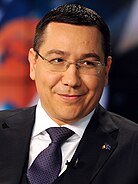Romanian presidential election, 2014
|
|
|||||||||||||||||
|---|---|---|---|---|---|---|---|---|---|---|---|---|---|---|---|---|---|
|
|||||||||||||||||
| Turnout | 9,723,232 (53.17%) (First round) 11,618,845 (64.10%) (Runoff) |
||||||||||||||||
|
|||||||||||||||||
|
|||||||||||||||||
A presidential election took place in Romania in 2014, and was held in two rounds, on November 2 and 16. In the first round, out of fourteen runners the top two candidates qualified in a run-off. Victor Ponta, Prime Minister and leader of the Social Democratic Party won around 40% of the vote, and Klaus Iohannis, mayor of Sibiu and leader of Christian Liberal Alliance, won around 30%. Following large protests on how Ponta's government organized the elections in the diaspora, Klaus Iohannis staged a surprising come-back and won the run-off with 54.5%, or more than a million votes more than his contender.
Ponta, serving as Prime Minister of Romania since May 2012, ran his campaign on promoting a national reconciliation message of a "great union" between all Romanians, defending his governance as balanced, with both left-wing and progressive measures, and promising to end the "era" established by the incumbent president, Traian Băsescu. However, his government faced some indirect international criticism, with U.S. Assistant Secretary of State Victoria Nuland criticizing in October 2014 what she called the "cancer of democratic regression and corruption" in several Central and Southeastern European nations and with politicians who "protect the corrupt office holders from prosecution and bypass parliament as often as it suits them". Iohannis, a Transylvanian Saxon, focused his campaign on judicial independence and fiscal relaxation, and promised to promote "Romania of thoroughness" and a "Romania of things well done," while blaming the country's economic and political problems on the regional governance of the Social Democratic Party, the so-called "barons".
...
Wikipedia


